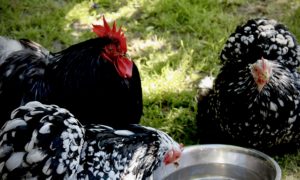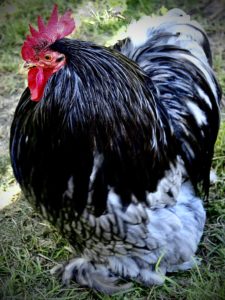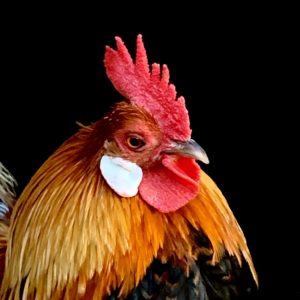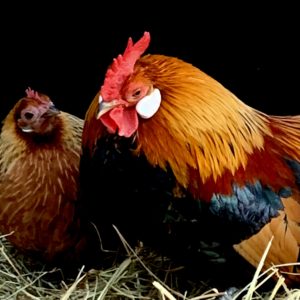
I had a question about keeping roosters and thought that I would answer it here, maybe it might help you too.
Early Winter – it is that time of year when chicks that have hatched in Spring are maturing and being sold on by breeders, or backyard poultry keepers. The chicks were cute, there is less room in the hen house now that the chicks are growing up.
Chicken breeders especially want to decrease their flock numbers over winter, keep the prize birds that were hatched in Spring eg. for colouring, shape and size. Selling the excess birds on that don’t suit their breeding program means less mouths to feed, keeps costs down on food and bedding materials over the wintertime and helps them empty their pens to a minimum and prepare for Springtime breeding.

Blueberry such a sweet Pekin rooster. 2015.
We have had several roosters over the years, some have been charming, absolute gentlemen, mild mannered and more interested in companionship with the hens, not breeding with them. Come Springtime these gentlemanly roosters may show signs of becoming more active and wanting to breed with some hens but they aren’t aggressive, they aren’t persistent and the hens don’t become stressed and loose lots of feathers on their necks and backs because the rooster is constantly trying to breed with them. These gentlemanly roosters are worth their weight in gold, but unfortunately not all roosters are like this.

Rococo the Dutch Bantam Rooster. A gentle soul & similar size to a pigeon.
Aggressive roosters.
I don’t have a problem with sending a rooster back to the earth if it is attacking us, and not a gentleman towards his ladies. I also don’t have a problem with passing these roosters on to someone who will humanely dispatch them quickly and have them for dinner. The rooster has had a good life, fresh air, free ranging, quality grain and a comfortable bed. It is never an easy decision and none of us at Fairy Wren Cottage take it lightly. (As a side note, we are vegetarian, mostly plant based eaters.)
We are responsible for these aggressive roosters and won’t sell them on, only for the rooster to become someone else’s problem. We also don’t want that kind of aggressive personality and disposition running through the gene pool. I think it is every breeders responsibility to make sure this doesn’t happen. I also believe that every person who does hatch eggs needs to be accountable for the roosters not just the hens that hatch. Early on when we weren’t as competent telling the difference between young female and male birds we were taken for a ride. Blatantly ripped off at different times by chicken breeders purposely selling us males instead of females, short term this might work for a quick sale but in the long term that chicken breeder develops a very quick reputation and I wonder how comfortable they sleep at night knowing they have genuinely deceived someone – especially when they see that a child is buying the bird and becomes instantly attached. It is heartbreaking when this kind of situation evolves because at the end of the day the rooster needs to rehomed or dispatched.
Anyone selling young birds and knows that there are males and females in the group needs to fully disclose this. Unfortunately not everyone does.

A tip for new poultry keepers.
Be aware that backyard poultry keepers and breeders will sell several birds the same age in one job lot, a trick to get you to buy all the birds, you think that you are getting all hens and they off load the roosters, making it no longer their problem but yours to sell or dispatch of the roosters. These birds will have hatched at the same time and be brothers and sisters, some don’t have a problem with letting the brothers and sisters breed but I do. I believe that it is unethical. For this reason any males that you have bought can’t be kept with their sisters, come the following Spring the male or males in the small flock will want to breed with the hens that are their sisters (or mother if you bought a hen and chicks). The males don’t realise they are related, nor do they understand the complexities of genetics. A roosters main objective come Springtime is to breed with as many hens in the flock as possible.
Keeping two roosters.
It never works, one will always try to be dominate over the other and make life miserable for the weaker one. Chasing the weaker one away, stopping them from eating, bullying and fighting them. The dominant rooster will usually try and be more dominant with the hens too, constantly trying to mate with them. This causes a lot of stress towards the hens and the flock in general. It is part of the animal world, the dominant rooster is trying to keep his dominant place in the flock. I understand it but definitely do not like it. Everything in the hen house is unsettled and revolves around the dominant roosters mood and aggressive energy.
How many hens does a rooster need to be kept with? (You may not want your child to be reading this part)
To speak plainly, if a rooster is only in with a couple of hens he will continually try and breed with them. The hens will be constantly mounted, their necks pulled, their neck feathers pulled out and as the rooster mounts the hen his body rubs on the hens back feathers, the hens back feathers will fall out, leaving the hens skin raw and it will get sunburnt. The hens will also try and run away and hide, the rooster will run after them and chase the hen until he catches it, holds the hen down by pulling on its neck feathers. It is very distressing to see and to even write about. This subject can be easily skimmed over in magazines because it doesn’t make for nice reading but I believe that it isn’t just the warm fuzzy stuff like chicks hatching that needs to be talked about.
What is a reasonable number of hens to keep with a rooster?
In my opinion, a rooster needs to be kept with at least 15 to 20 hens for the sake and health of the hens, I know that some will disagree with this. If you see a rooster favouring a certain hen, that hen needs to be taken out of the flock with another hen to keep her company, a week or two of respite and recovery is necessary. I also do not like the “saddles” you can buy to put on a hen to stop a rooster from pulling out the hens feathers (as explained above). Why should the hens suffer. Remove the rooster from the pen instead. If you do want to collect fertile eggs to hatch or sell then this should be done over a short period of time to keep the hens health from suffering. I appreciate that some people want to sell fertile eggs for extra pocket money but the birds health needs to be the first priority not the last.
Keeping a large breed rooster with smaller hens.
Definitely isn’t fair on the small hens. I’ve already explained the reasons in the paragraph How many hens does a rooster need to be kept with?
Keeping a small breed rooster with large hens.
This combination has its advantages because the small breed rooster, for example a silkie, pekin or dutch bantam can’t physically breed with the larger hens, for example Orpingtons or Australorps. The large breed hen has size and weight on their sides and will quickly put the small rooster in his place, sometimes just by even looking at the rooster! The small rooster isn’t for breeding with the large hens, the small rooster is a companion to the larger hens, helping them find things as they fossick about, basking in the sun together, the rooster keeps watch over the hens and sounds the alarm if a predator comes in range. Each time I go into the hen house on a cold night to check on everyone the small rooster is snug and warm tucked under the large hens wing, the hen certainly wouldn’t allow this if she didn’t want to.
I like keeping a small rooster, compared to a large breed rooster they are more manageable, eat less, don’t crow as loud, and the hens seem calmer.
The word count for this blog article is at 1342 words, the equivalent of a magazine article. I’ll leave it here for now, I hope it has helped answer some of your questions, maybe enlightened you or inspired you. Put some seating in your hen house or in their garden area, it will help you get to know them better, the flock dynamics and their loveable personalities.
Until next time,
Jude x
Winter 2022 – Roosters in the Hen house.
June 17, 2022
This is, by a long way, the most informative article I’ve found about Roosters. Thank you so much. This is incredibly helpful. I know need to find two roosters a new home before Spring! Thank you Jude xxx